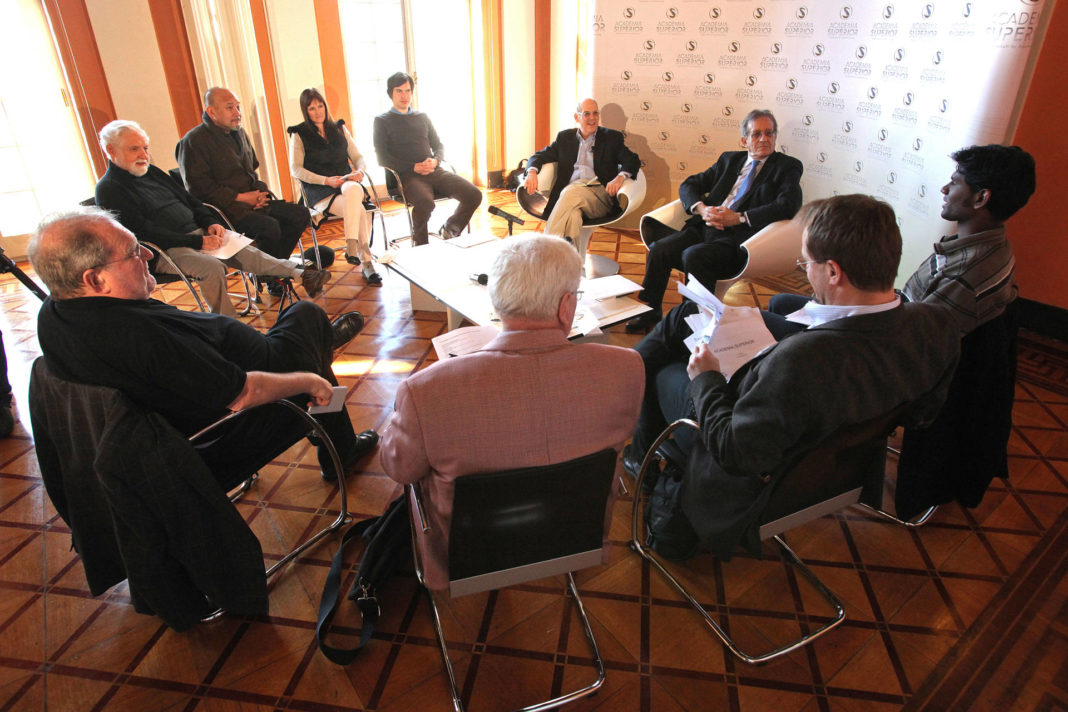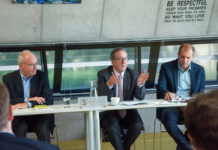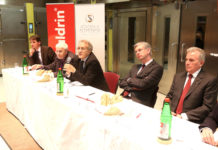After two days of intensive discussions the second SURPRISE FACTORS SYMPOSIUM by ACADEMIA SUPERIOR — Institute for Future Studies came to an end on Sunday, March 18. The end of the symposium marks the beginning of the work with the questions, topics and challenges connected to the „old” and the „new”.
Space, history and generations: Conversations between China, USA, and Europe, dialogues between old and young
Four extraordinary personalities from different regions of the world met, in order to discuss the topic „the new old” and aspects of the old an the new in their respective relativity and changeability together with members of the advisory board and students. Given the great challenges and surprising developments of our time issues surrounding the ever-aging society on the one hand and the fast pace of our highly technical time on the other hand were addressed from the perspectives of the U.S., Europe, and China.
What is old, what is new?
A variety of complex topics and perspectives entangles the supposedly simple terms of „old” and „new”:
- The new new — which new developments will persist, will stay with us in the future and remain new?
- The new old — which new trends will fade after the first hype and be old really soon?
- The old new — which old values will be revived in the future and provide us with new answers?
- The old old — which old concepts will remain old and fade from our memories?
The gift of aging
Helmut Kramer, economist and chairman of the Austrian Interdisciplinary Platform on Ageing, poses the important question what ageing really means — both individual ageing and the ageing of the society. „The gift of the 20th century was longevity, the increasing life expectancy of three years in the last decade or four months every year, which people automatically gain.” The resulting problem of financing the pension system is just one aspect which conceals a possible conflict of generations.
Dialogue between generations
In a democracy the majority decides but if people are living longer, what does that mean for the younger generation that finances social security? What happens when the working population becomes a minority in a state? What happens when the working young people are no longer willing to finance the welfare of the older generation?
Design as a bridge
The Belgian-born Jehanne de Biolley and Harrison Liu, a Chinese with a Canadian passport, live in a temple in Beijing and are wellknown designers in China. With his furniture Harrison Liu combines old traditions with new and fresh contemporary aspects. The fast pace in the design industry also marks the beginning of the growing open-mindedness. „Design” has also become a buzzword in the western world far beyond the boundaries of art. Companies, countries, and lifestyles are being „designed” today. It is not only about creating a better lifestyle, like using design as a means of promoting individuality, but using existing and natural resources in the design. The two designers from China consider a design accustomed to environmental factors as essential in our time.
National suicide
Carl Djerassi, chemist and co-inventor of the „pill” divides the world in geriatric and pediatric countries, i.e. countries that secure their existence due to high birth rates and countries that face a massive decline of population due to a declining birth rate. To maintain the current level, a birth rate of 2.1 is required. In Austria it is currently 1.5. One possibility to address the issue is immigration. Here countries are better off that are attractive to migrants while in countries with little future prospect young people additionally leave. According to Djerassi, Austria is heading towards a „national suicide” because of the prevailing xenophobia and immigration policy.
60+ are two generations
The division between old and young in terms of employment is not simple any longer. Thus, the generation 60+ are really two generations, those, who are still actively participating in society and those who no longer can. The challenge is in finding ways, means, and possibilities to engage a healthy, old population actively in civic life and not to „push them off” into retirement.
Sex and reproduction are separated
We are living in a world in which sex and reproduction are completely separated processes. „Sex happens in bed, reproduction under the microscope”, Djerassi says provocatively and poignantly. He also raises the question why young women would not freeze their eggs, be sterilized, and fertilize their own younger eggs at a later point in life when they want children. This would eliminate all risks of a pregnancy after the age of 35. Djerassi does not understand legal prohibitions of artificial fertilizations of this kind, such as found in Austria.
The problem is in the software
The alarming decline in birth rates is not a result of the invention of the pill. Contraception and abortion are the hardware, but the means are not decisive. Rather it is about the „software”, the economic and political conditions that impact national population. Djerassi mentions kindergartens and nurseries at working places, as found in Scandinavia or Israel as models that can be implemented quickly.
Re-developing old ideas for the future
To rethink and promote larger family structures would be a possible starting point for many of the mentioned problems. Can the solution be found in the end of the traditional nuclear family? And why put a stress on national population growth if the world is overpopulated and humanity in general uses too many resources, one of the participating students asks provocatively.
Not in the ivory tower
To deal with the questions of the future and to develop concrete recommendations for action is the objective of ACADEMIA SUPERIOR. Discussions to do not take place in the ivory tower but are checked for how they can be implemented. The participation of governor Josef Pühringer in the final discussion shows that this endeavor is recognized and welcomed also in politics.
At the end of the day the question is: Which incentives do the discussions give for working on issues that are important to Upper Austria? In the first step towards answering this question the symposium will be summarized in a report edited by Alan Webber. In this process we will identify the topics ACADEMIA SUPERIOR is going to work on over the coming year.







